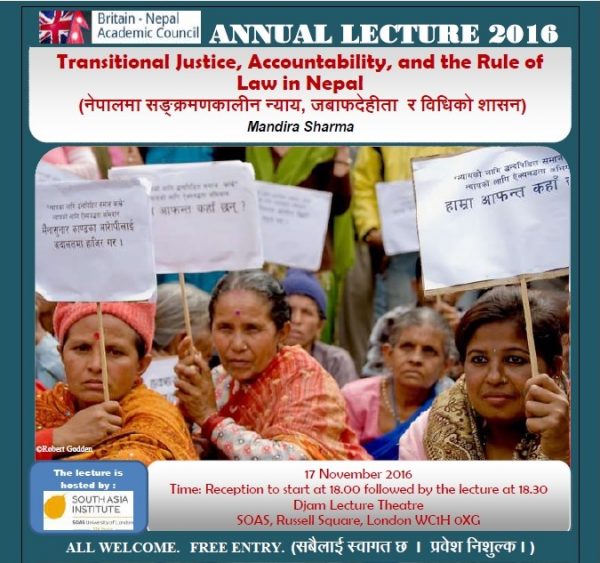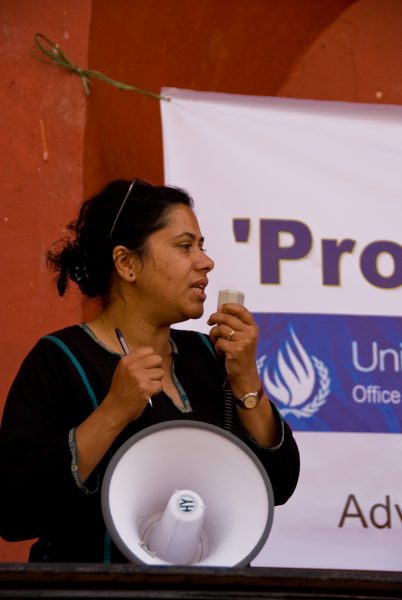Event Britain - Nepal Academic Council › Events › Internal Events
Latest News
FINAL Conference Programme: BNAC Nepal Study Days, 24-25 April 2025FINAL Conference Programme: BNAC Nepal Study Days, 24-25 April 2025 The final conference programme o...
Read MoreBNAC Annual Lecture 2016
Event Date: November 17, 2016Transitional Justice, Accountability, and the Rule of Law in Nepal
(नेपालमा सङ्क्रमणकालीन न्याय, जबाफदेहीता र विधिको शासन)
BY: Mandira Sharma
Time: Reception to start at 18.00 followed by the lecture at 18.30
Djam Lecture Theatre
SOAS, Russell Square, London WC1H 0XG
ALL WELCOME. FREE ENTRY. (सबैलाई स्वागत छ । प्रवेश निशुल्क । )
Abstract
In recent years Nepal has been facing constant contests and demands for a more inclusive democratic process and structure. People have started to feel strongly the absence of rule of law and accountability, which is popularly expressed in Nepal as ‘system nai chaina’ (there is no ‘system’). Nepali society experienced the opening of space for human rights and rule of law after the political change of 1990. However, its tolerance to impunity threatened the foundations of newly established democracy and eroded people’s confidence in the state, thereby laying the groundwork for the Maoist-led ‘People’s War’.
The agenda of social inclusion, devolution of power, proportionate representation and need for economic prosperity and development have surfaced vividly after the civil war and subsequent Madhesh Movement. Some progress has also been made. However, inclusive democracy, social inclusion, and efforts to address inequality remain fragile in the absence of a political culture that respects the rule of law and accountability. In this lecture, I will consider the challenges that Nepali society faces in restoring the rule of law. I will also discuss how the state continues to perpetuate exclusion, discrimination, and marginalisation even today.
The lecture will draw upon my personal experiences of working with the victims of human rights violations for the last two decades. I started work with survivors of torture in the 1990s and then began to work with the victims of human rights violations generally, mainly the families of victims of enforced disappearances and killings, and survivors of rape and torture. A question that haunts me every day is: Despite so many human rights violations in Nepal, why has not even a single perpetrator had to face a court of law? I am also troubled to see the extent to which Nepali society tolerates impunity. What compels Nepali society to tolerate this extent of impunity? Has there been any change in recent years in this regard? What lessons have we learned from past mistakes? The lecture will discuss how transitional justice mechanisms come into play in relation to some of these questions.
Speaker’s profile
Mandira Sharma is a leading human rights activist from Nepal. For the last two decades she has been working to promote human rights and the rule of law by monitoring and documenting cases of human rights violations, and by challenging such cases through advocacy and litigation at both national and international levels. She is known for her work against impunity in Nepal
In the face of enormous challenges, Sharma led a team of more then 100 lawyers and human rights defenders during Nepal’s civil war (1996–2006). Her work helped to expose the extent of human rights violations against civilians during the conflict. Her NGO, Advocacy Forum, was instrumental in ensuring international scrutiny of the human rights situation in Nepal.
Sharma played a major role in organizing and empowering victims groups, as well as in advocating for a comprehensive transitional justice mechanism in the country. Following the comprehensive peace accord in Nepal (2006), her work focused on challenging impunity and promoting accountability. She has represented a number of victims of human rights violations from Nepal before the UN Human Rights Committee and also victims who have brought cases under universal jurisdiction.
She is currently pursuing a PhD at the University of Essex, researching transitional justice issues. She has a Master’s in International Human Rights Law, also from the University of Essex.




